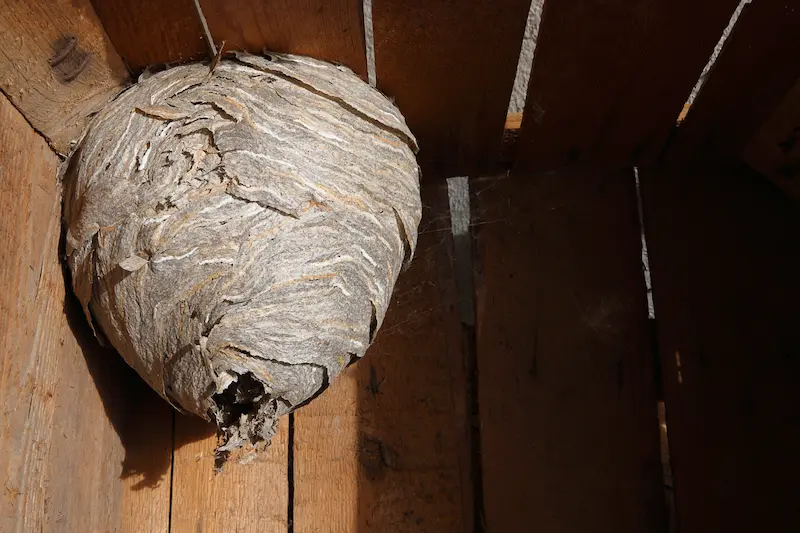
Hornets are skilled builders that create nests in a variety of locations, including wall voids, open areas, and even underground. Unlike bees and wasps, hornets usually don’t hide their nests. Instead, they often build in trees, shrubs, beneath eaves, or inside walls. While they may resemble wasps, their nesting habits differ, and recognizing these differences can help you spot and manage them more effectively.
Recognizing a hornet nest early can help you avoid painful stings, as these aggressive insects are highly territorial. Learn why they pose such a serious threat.
The Most Common Type of Hornet Nests
In Virginia, the most common hornet nests you’ll come across are built by European hornets and bald-faced hornets. Each species has unique traits that help with identification:
Bald-Faced Hornet Nests
Bald-faced hornets typically nest in exposed areas such as trees, shrubs, or under roof eaves. Their gray, paper-like nests are round and can grow as large as 24 inches across, often hanging visibly from structures.
Even though these nests are easy to spot, they should always be avoided. Protect your outdoor spaces by taking steps to discourage hornets from settling nearby.
European Hornet Nests
European hornets prefer to build their nests in sheltered areas like wall voids, attics, and hollow trees. These nests are large and enclosed, made of papery material that can support hundreds of hornets.
The surface of their nests is smooth and layered, crafted from chewed wood fibers that give it a paper-like appearance.
Where Are Hornet Nests Found?
Hornets adapt their nesting sites based on their environment, often settling in places that bring them close to homes. Keep an eye out for nests in the following spots:
- Exposed Locations: These nests are often found hanging openly from tree limbs or nestled inside dense shrubs, making them easy to spot.
- Ground Nests: While less common, certain hornets may establish their nests right at or just beneath the surface of the ground.
- Sheltered Areas: Rooflines, sheds, and porches offer ideal coverage for bald-faced hornets to construct their nests.
- Hollow Trees: Natural tree hollows offer hornets a protected and stable environment for building large colonies.
- Wall Voids: European hornets are known to build their nests out of sight within the cavities of walls or building structures.
The location of a hornet nest often reveals which species built it, helping homeowners determine the best course of action. Our stinging insect specialists can accurately identify the species based on the nest and recommend safe, targeted removal solutions.
Need Hornet Control?
Need Wildlife Or Pest Control?
Leave your information below and we’ll be in touch with a FREE quote!
"*" indicates required fields
*During normal business hours. After hours calls will be returned the next business day.
Need Help With Hornet Nest Removal?
Finding a hornet nest near your home can be both dangerous and overwhelming. Avoid the risk of painful stings by letting our experts handle removal safely and effectively. Our team uses proven methods to ensure the nest is completely eliminated. Learn how our professional services can protect your family.
Reach out to Xceptional Wildlife Removal today for a no-cost quote and expert recommendations customized to your pest control situation.
FAQs
What is the difference between a hornet nest and a wasp nest?
Hornet nests are generally larger and round, made from a gray, paper-like substance. They’re commonly found in trees or under roof eaves. Wasp nests vary widely in shape, size, and materials depending on the species, ranging from open hexagonal cells to comb-like or enclosed structures. Both types serve as homes for their colonies.
Should I just leave a hornet’s nest alone?
If the nest is far from areas of human activity and not posing a threat, it’s usually safe to leave it since the colony dies off in winter. However, nests near homes or frequently used areas should be handled by pest control experts.
Should I destroy a hornet’s nest?
No. Attempting to destroy a hornet’s nest yourself can provoke aggressive behavior and increase the risk of stings. Professional pest control specialists have the knowledge and equipment to remove nests safely.
Should I be worried about a hornet’s nest?
Yes. Hornet nests near places with human activity can be dangerous because hornets are protective and can sting multiple times. It’s best to keep your distance and contact a professional for removal.
How long will a hornet’s nest last?
Hornet nests usually last one season. The queen starts building in spring, the colony grows during summer, and by winter, the colony dies off and abandons the nest, as hornets rarely reuse old nests.
Identifying Hornet Nests: What You Need to Know in Virginia, Georgia, Louisiana, and Maryland
Maryland, Ohio, Kentucky, and Delaware
Virginia | Louisiana | Georgia | Pennsylvania | West Virginia | New Jersey | Maryland | Ohio | Kentucky | Florida | Delaware
Home » Identifying Hornet Nests: What You Need to Know
